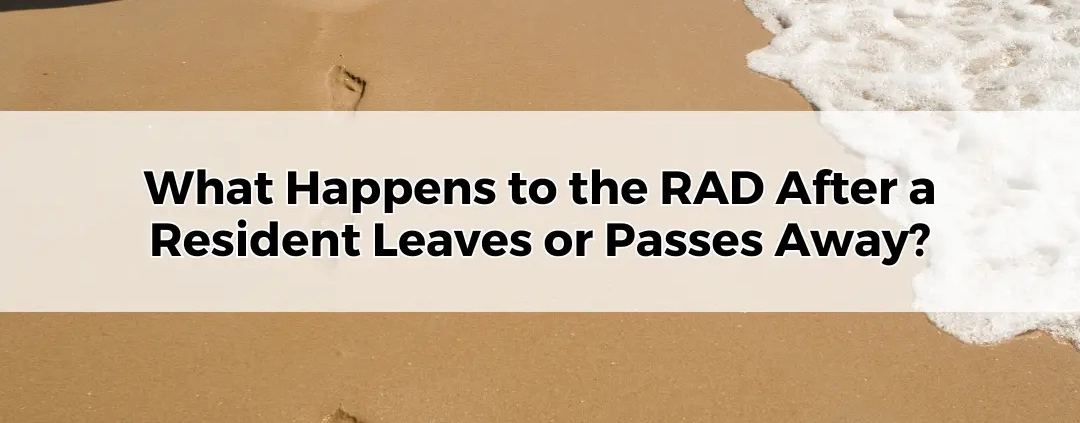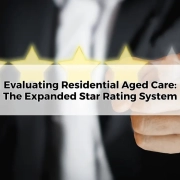What Happens to the RAD After a Resident Leaves or Passes Away?
Table of Contents
ToggleIn Australia, the Refundable Accommodation Deposit (RAD) is a substantial financial component of residential aged care costs. Paid by residents entering aged care facilities, the RAD is a deposit that can significantly impact estate planning and financial decisions. Understanding what happens to the RAD after a resident leaves or passes away is crucial for both residents and their families, ensuring smooth management of finances and expectations around refunds. This blog explains the RAD process, refund timelines, and financial implications after a resident departs or passes away.
Introduction to the RAD (Refundable Accommodation Deposit)
- What is the RAD?
The RAD is a lump-sum payment made by aged care residents to secure their accommodation in a residential aged care facility. It functions like a bond and is typically returned to the resident or their estate upon departure. - Purpose and Role of the RAD in Aged Care
The RAD serves as an interest-free loan to the care provider, helping to fund operational costs and infrastructure within the facility.
Options for Paying the RAD
- Lump-Sum Payment
Residents may pay the RAD as a full lump-sum, which is entirely refundable. - Combination of RAD and Daily Accommodation Payment (DAP)
Some residents pay part of the RAD upfront and cover the remaining amount through a Daily Accommodation Payment (DAP), with only the RAD portion refundable. - DAP-Only Payment
Paying solely through the DAP means there is no RAD and thus no refund upon departure or death.
What Happens to the RAD if a Resident Leaves the Facility?
- Refund on Departure
If a resident leaves the facility to live elsewhere, the RAD is refunded, typically within 14 days after departure. - Deduction of Outstanding Fees
Any unpaid fees, such as care fees or additional service fees, may be deducted from the RAD refund before it is returned to the resident.
Process for RAD Refund When a Resident Passes Away
- Standard Refund Period
By law, the aged care provider must refund the RAD within 14 days after receiving probate or letters of administration (legal confirmation of the executor’s authority to administer the estate). - Extensions for Probate Delays
The provider is not required to refund the RAD until probate or administration documents are received, so delays in these legal processes may extend the RAD refund period.
Deductions from the RAD Before Refund
- Outstanding Fees
Any unpaid daily care fees, extra service fees, or costs associated with the resident’s care are deducted from the RAD balance before the refund. - Damage and Cleaning Costs
In rare cases, if there is substantial damage to the accommodation, cleaning or repair costs may be deducted from the RAD, though this must be justifiable and documented.
How the RAD Affects the Resident’s Estate
- Including the RAD in Estate Planning
The RAD is generally considered part of the resident’s estate, meaning it will be distributed according to the terms of the resident’s will. - Tax Implications of the RAD Refund
The RAD refund is not typically subject to income tax; however, it may influence the overall estate value, affecting inheritance and estate taxes.
Refund Timelines and Legal Requirements
- Legal Time Frames for RAD Refunds
Aged care providers are required to refund the RAD within 14 days after receiving the necessary probate or administrative documents. - Consumer Protection for Delayed Refunds
Regulations ensure that the RAD is refunded promptly, protecting the resident or their estate from undue delays.
Managing the RAD Refund Within the Estate
- Role of Executors in the Refund Process
Executors are responsible for notifying the facility, providing probate documents, and ensuring the RAD refund is included in the estate distribution. - Communication with Aged Care Providers
Effective communication between the family or executor and the aged care provider can streamline the RAD refund process and prevent misunderstandings.
RAD Refund Process When There is No Will
- Intestate Situations (No Will)
If the resident dies intestate (without a will), the RAD refund process follows state-based intestacy laws, potentially slowing down the release of funds. - Administration Requirements in Intestate Cases
The RAD refund requires letters of administration in intestate cases, as aged care providers need legal proof of the representative’s authority.
Financial Planning Considerations for RAD Refunds
- Planning for Heirs and Beneficiaries
Including the RAD in an estate plan helps avoid disputes and clarifies how the refunded amount will be distributed among beneficiaries. - Using RAD Refunds for Surviving Spouse’s Care
For married couples, RAD refunds can provide additional funds for a surviving spouse’s aged care or health needs, offering flexibility and financial security.
Impact of RAD Refund on Age Pension and Means Testing
- Impact on Pension and Aged Care Fees
If a surviving spouse receives the RAD refund, it may impact their pension eligibility or aged care means-tested fees, as it increases their assessable assets. - Strategies for Managing Refund to Minimise Asset Tests
Planning around the timing and allocation of the RAD refund can help minimise its impact on pension means-testing, potentially preserving benefits.
Differences in RAD Refund Policies Across Providers
- Variations in Facility Policies
While the refund rules are largely standardised, certain details may vary between providers, including processing times or requirements for claim documentation. - Clarifying Policies Before Admission
Understanding the provider’s specific RAD policies can prevent surprises for families and facilitate smoother financial planning.
What Happens if the Aged Care Provider Becomes Insolvent?
- Government Protections for RAD Refunds
RADs are safeguarded under government regulations, meaning that if a provider becomes insolvent, the government guarantees RAD refunds up to a capped amount. - Steps for Families in Insolvency Situations
In the rare event of provider insolvency, families should consult with legal or financial advisers to understand their rights and the RAD refund process.
Considering Alternatives to the RAD to Minimise Risk
- Choosing a DAP Over a RAD
Opting for a Daily Accommodation Payment (DAP) instead of a RAD removes the need for a large upfront payment, reducing estate complexities if a resident passes away. - Combination Payment Options
Residents may choose a mix of RAD and DAP payments to retain some of their capital while meeting facility requirements.
Key Takeaways on Managing the RAD After a Resident Leaves or Passes Away
- Ensure Probate Documents Are Ready for Timely Refund
Ensuring probate or administrative documents are prepared quickly can accelerate the RAD refund process for the family. - Maintain Clear Communication with Facility and Executor
Staying in contact with the aged care provider and designated executor can prevent misunderstandings and streamline the RAD refund process.
Conclusion
- Importance of Estate Planning Around the RAD
Considering the RAD in estate planning provides a clear financial path for families, avoids complications, and helps manage the impact on inheritance. - Seek Professional Advice for Smooth Financial Management
Working with financial and legal advisers ensures that the RAD refund process is straightforward and supports family goals for aged care funding and legacy.
The RAD plays a central role in funding aged care and protecting resident rights. By understanding the refund process, residents and families can plan ahead, ensure smooth transitions, and maximise the benefits of a well-prepared financial strategy.









